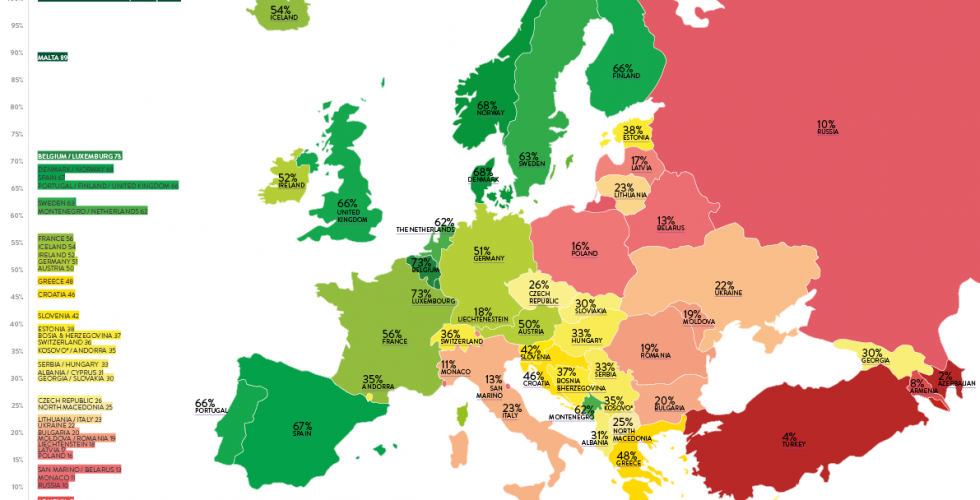
A pivotal moment for LGBTQI rights in Europe
ILGA Europe's yearly Rainbow Europe Map, where LGBTQI people's rights in the European countries are scored and ranked, has been launched. Sweden keeps its position as number ten in the European ranking.
Rainbow Europe Map 2020 shows that developments have now reached a pivotal moment. Either the living conditions of LGBTQI people in Europe keep improving, though unevenly and at different paces, or the development comes to a halt and deteriorates in several countries. ILGA voices special concern about the countries that have lost ground in this year’s survey, which are, among others, Hungary and Poland.
Like last year, Malta, Belgium and Luxemburg are at the top of the ranking. At the bottom, we find Azerbaijan, Turkey and Armenia. Sweden is in tenth place and thereby fulfils 63 percent of the criteria. Other countries ranked higher than Sweden are Norway, Denmark, Spain, Portugal, Finland and Great Britain.
The areas being scored are:
– gender equality and non-discrimination,
– family law,
– incitement to hatred and hate crime,
– recognition of legal gender and bodily integrity,
– rights to free assembly, association and expression, and
– asylum rights for LGBTQI people.
Among the issues lowering Sweden’s score are:
– that the Swedish gender recognition act isn’t based on self-determination,
– that the gender recognition act calls for a psychiatric evaluation to change legal gender,
– that an age-limit for changing legal gender still remains in the gender recognition act,
– that there’s no ban on medically non-motivated surgical procedures on intersex people without the individual’s informed consent,
– that there’s no gender-neutral parenthood presumption,
– that there’s no ban on conversion therapy, and
– that the discriminations legislation doesn’t forbid discrimination based on sex characteristics (i.e. it’s legal to discriminate against intersex people).
– No new victories for LGBTQI rights have been celebrated in Sweden for many years. A reformed gender recognition act based on self-determination, where trans people can change their legal gender through a simple administrative procedure, has yet to be developed. This in spite of the government having promised this reform for several years, says RFSL’s president Deidre Palacios.
A deeply disturbing development is that many countries have lost ranking points this year compared to last. At the same time, improvements in isolated areas have been made in 51 percent of the countries since last year. In many countries, trans people’s rights have been strengthened, while in other, they have been weakened and points have been lost. Azerbaijan, Serbia, Great Britain and Hungary are among those losing points because existing legal opportunities to change legal gender or first name aren’t being implemented in practice, while Poland and Turkey lose points for failing to uphold basic rights such as the right to free assembly and association. Hungary has lost as much as 8,5 points and is thereby the country which, compared to last year, loses the most points in total.
– Even before the corona pandemic, countries such as Hungary, Poland and Turkey have been recognised for carrying out politics that affect LGBTQI people negatively. The current suggestion on a ban against changing legal gender in Hungary, proposed laws about a strengthened ban against abortion and a ban on sexual education in Poland, and statements by Turkish leaders about how the coronavirus is spread by LGBTQI people are all alarming signals about how governments with strong authoritarian traits are using the corona crisis to limit the rights of already vulnerable groups, says Darienne Flemington, one of ILGA Europe’s two presidents.
However, positive changes have been made in some countries. The countries who have received the highest number of new points are Montenegro, the Netherlands and Northern Macedonia. The change in all three countries has been a strengthening of the protection against discrimination for LGBTQI people. ILGA Europe also notes that the improvements in Europe regarding same-sex families basically have come to a halt. During 2019 there were improvements only in Northern Ireland (a part of Great Britain) where gender-neutral marriage was introduced, and in Monaco, which established a form of registered partnership with limited rights.
– If there has ever been a time when European governments and institutions should stand by the defence of the rule of law and human rights, this is it, Darienne Flemington concludes.
